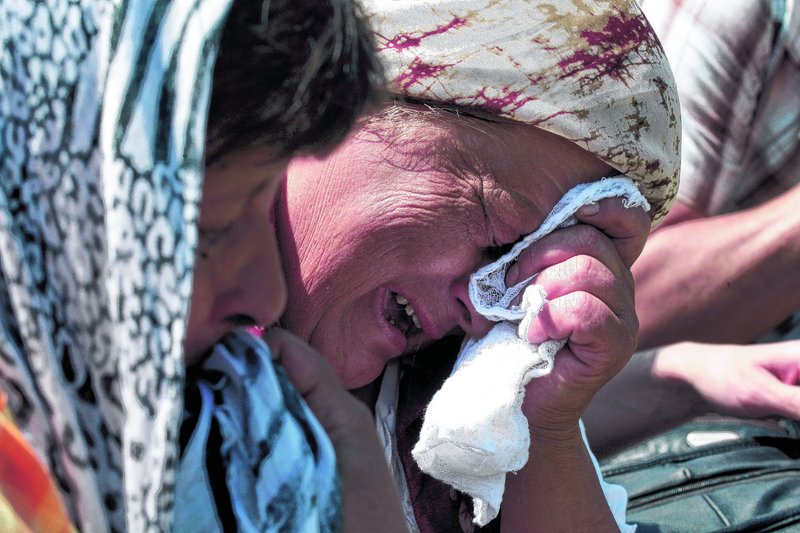LAZAREVO, Serbia – It’s hard to keep a secret in this leafy village in northern Serbia — and that’s what makes war crimes suspect Ratko Mladic’s arrest such a surprise.
Villagers who admit they know far too much about each other say it just can’t be true that they’d have an outsider in their midst without their knowledge. Neighbors have often been at the home of Mladic’s relative — a simple man who lived alone in a house with a big gate, some overgrown roses and a cherry tree — but never saw cousin Ratko.
“No one, really I swear, has seen him,” said Nedeljko Arsic as he and other locals paused on their bikes to watch the police and the journalists snapping pictures and trying to get a glimpse inside the family compound, complete with tractor and corrugated steel-roofed outbuilding.
Masked police seized Mladic, 69, as he headed out to his garden for a pre-dawn walk on Thursday, Serbian police officials told The Associated Press. Similar raids have been conducted throughout Serbia for years in the hunt for Mladic, who went underground seven years after his 1995 indictment by the U.N. war crimes court on charges of genocide, crimes against humanity and war crimes.
But police describe coming across Mladic almost by accident — and say that it was the first time they’d raided the home just off a single-lane road. They say he was very pale, suggesting he rarely ventured outside.
But the people of Lazarevo have their doubts about the official version of events. And in a country that loves a conspiracy theory, they are not the only ones who say something is awry in the account of the capture of the infamous fugitive from justice, said Zoran Dragisic, a political analyst.
Serbs also have noted that the man who was captured is a shadow of the vigorous commander who laid siege to Sarajevo and is accused of being the architect of the Srebrenica massacre — the worst such atrocity in Europe since World War II. He’s aged. Relatives say he can barely talk.
“What is obvious is that Ratko Mladic is very ill. According to doctors, he had two strokes, and it’s clear that a man in that condition cannot live on his own,” Dragisic said. “He needed special medical assistance, so I really don’t believe this story that he lived alone without help.
“Even if the official version is true, there is a question how Serbian intelligence services were not able to find some old, ill man who is hiding in a village.”
The people of Lazarevo, 35 miles north of the capital, Belgrade, can’t help but wonder, too.
Father Ivan Popov, an Orthodox priest, says that contrary to what authorities have said, police have searched the community before, begging the question of why they didn’t find him before. Neighbors also insist that Mladic’s cousin, a farmer who lived in this community all his life, was just not capable of the guile needed to hide a war crimes suspect — even if it were only for a little while, as police suggest.
To hide out, a fugitive would have needed help.
“Who helped him all this time, that’s the question,” Arsic said. Mladic “couldn’t have done it by himself.”
Authorities have long tried to crack the close circle of military officers, nationalists and other sympathizers thought to have protected Mladic and given him the funds to keep moving — sometimes only days ahead of the police. Nearly 16 years on the run, Mladic’s safehouses have included military bases, apartments owned by former military officers or their relatives in the capital, Belgrade, and reportedly even a hospital.
But as the years dragged on, the undercurrent of Mladic’s support began to falter. Serbia’s new Western-leaning government gradually isolated the nationalists within the system, slowly dismantling the underlying power structure that kept supporters of former President Slobodan Milosevic in power.
But even if the country hadn’t moved on, Mladic could have scarcely found a village more welcoming. People who live in this staunchly nationalist community of 3,000 say they would have sought to protect Mladic, a general seen as a hero who fought to defend the Serbs in the wars that followed the disintegration of Yugoslavia — had they known he was here.
Many in the community are descendants of people who once left Bosnia themselves as part of a post-World War II program designed to promote ethnic integration in this corner of northern Serbia. As far as they’re concerned, Mladic is one of their own.
“No real Serb would ever think Mladic is a war criminal,” Popov said.
He plans a service Sunday at his community church to pray for Mladic’s health.
Civic leaders are talking about renaming the village Mladicevo — as a tribute to the general who took refuge there.
Send questions/comments to the editors.



Success. Please wait for the page to reload. If the page does not reload within 5 seconds, please refresh the page.
Enter your email and password to access comments.
Hi, to comment on stories you must . This profile is in addition to your subscription and website login.
Already have a commenting profile? .
Invalid username/password.
Please check your email to confirm and complete your registration.
Only subscribers are eligible to post comments. Please subscribe or login first for digital access. Here’s why.
Use the form below to reset your password. When you've submitted your account email, we will send an email with a reset code.